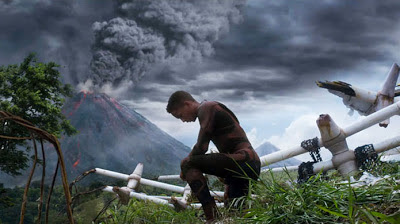 |
| Jaden Smith takes a knee in After Earth. |
«1/2 After Earth. Written by Gary Whitta & M. Night
Shyamalan. Directed by M. Night Shyamalan. At area theaters.
Most
kids get an X-box or a bike for their birthdays. When you’re Jaden Smith, son
of Will Smith, you get to co-star in a summer blockbuster. Jaden’s 15th
birthday is coming up on July 8th, and the movie is M. Night
Shyamalan’s sci-fi survival epic, After
Earth. That proud Papa Will is eager to launch his son’s career as an
action hero is perhaps not surprising. What is surprising is that Jaden must
share his gift with L. Ron Hubbard, prophet of the controversial religion
repeatedly tied to his father.
On the
surface, After Earth is another
post-apocalyptic adventure that portrays humanity’s relationship with Planet
Earth in the past tense. After an interstellar war with aliens, humanity is
forced to abandon the planet—though the script to Gary Whitta and Shyamalan are
none too clear on any of this. The aliens, it seems, have attacked us using bio-engineered
monsters that target “pheromones” human secrete when they are afraid. The key
to defeating them, then, is to become invisible to the creatures by banishing all
trace of fear (a state called “ghosting”), and sticking them with a pointy
object. This is apparently a superior strategy to the one I’d pick: shooting
them with a big gun.
Smith père plays “General
Cypher Raige”, the acknowledged master of “ghosting”. Though he’s a legendary
warrior, Raige is an absentee father to his troubled son, Kitai (Jaden). To
repair their relationship, dad invites son on a business trip. All goes
seriously wrong, however, when they crash-land on planet Earth—a place now quarantined
because “everything [there] has evolved to kill humans”. How all the plants and
animals have “evolved to kill humans” when humans no longer live there is just
one of the script’s many imponderables.
Dad is
injured in the crash, so Kitai, who is emotionally volatile and untested in the
field, must journey sixty miles on foot to retrieve a space beacon. Again, you wonder
how a civilization that has mastered interstellar travel can’t manage to build
an emergency beacon that goes off automatically in case of a crash—but never
mind. Instead, we watch Jaden bushwhack his way through what looks like Sequoia
National Park, as his dad dispenses advice in his ear-piece like “Danger is
real, fear is a choice” and “Fear is a lie we tell ourselves”. By the fourth
time Raige orders his son to “take a knee”, like a high school coach who won’t
shut up, we wonder why the kid hasn’t turned off the radio already.
The
action-adventure is lackluster, and the design of the movie, which is supposed
to suggest a vaguely Jobsian bio-tech, ends up making our future look like the
part of a Thai restaurant just before the bathrooms.
But
that’s not the real story of After Earth.
Will Smith, who is given story credit here, has filled it with elements that are,
if not overtly Hubbardian, very close to it. The quest to overcome negative
emotions like fear—which Hubbard taught were implanted in human souls by a
malicious alien race—is one of the challenges of becoming a high-functioning,
or “clear”, Scientologist. The climax of the movie takes place on an exploding
volcano, which is the public symbol of Hubbard’s self-help method, Dianetics. For
those who like to do the research, more interesting parallels between
Scientology and the movie can be found on Reddit.
Scientology-flavored
movies like Battlefield: Earth and Oblivion have not been hits, which is
surprising given that L. Ron Hubbard started his career pounding out pulp sci-fi for pennies a word. Ironically,
Hubbard was infinitely more successful as a prophet than he was as a hack writer—a
fact that exasperates many members of his Church. Will Smith denies he is
a member of the Church of Scientology, though he has publicly defended it, has
given lavishly to it, and runs a private school, the “New Leadership Academy”,
that reportedly incorporates Church principles in its curriculum. One of the
students there is Suri, daughter of Tom Cruise.
Hubbard
may have failed as a writer, but he was a canny shaper of minds who understood
the value of a “Trojan Horse” approach to building up his flock. Pack ‘em in
with sci-fi adventure, or pack ‘em in with self-help, but just pack ‘em in. Alas,
the disappointing box office numbers for After
Earth would not please the Admiral.
©
2013 Nicholas Nicastro
